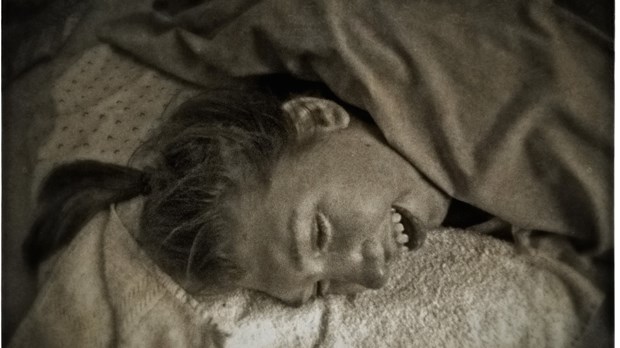
"Good morning, sweetie peetie," I greet Temma each morning, my own eyes still half-shut when I paddle into her room. Her eyes are most often open as if she has been waiting for me. She startles a bit at the sound of my voice, her arms and feet lifting up and her eyes becoming even more round with wonder. I can see the faintest upturn at the corners of her mouth. I stroke the side of her face and she makes a slight sound, sticking out her tongue in greeting.
To describe my daughter, Temma, as "profoundly other" is not to separate her from more able-bodied humanity. Nor is it to say that she is from some other alien world or spirit-world that we cannot know (although this may be some of my meaning). For me to describe Temma Day Lowly—a twenty-eight-year-old young woman who looks to be a strange child in a wheelchair, whose hands, arms and feet are twisted, whose tongue is often sticking out and drooling spit, and whose eyes are focused somewhere else—as profoundly other is my attempt to find some way to tell you that she shares a common, made-in-the-image-of-God humanity with me and with you.
I once overheard our good friend's seven-year-old son defending Temma to some neighborhood kids. They stared and asked, "What's wrong with her?"
Hearing their question makes me think of Jesus' disciples when they encountered a man born blind. They asked him, "What's wrong?" "Who sinned, this man or his parents?"
"What's wrong with her?" brings back twinges of the shame and guilt I felt for many years after Temma's cardiac arrest at day two of her life. My shame from feeling that I am not good enough to birth a healthy baby; my guilt in believing l must have done something wrong, made some grave mistake deserving the punishment of a brain-damaged child by an angry God. The mistakes replay in my mind. I should not have brought her home from the hospital so quickly; I should have had more milk for her; I should have fed her formula. I should not have worked all nine months. I should have eaten more, eaten better, taken more vitamins. I should have insisted that we go to the hospital before we did. I should not have worked as a waitress for so long. Like blankets we used as kids to make a tent, I crawl under the doubt, blame, shame, anger, rage, and guilt, a canopy that swallows me up.
I try to walk more slowly when I'm out pushing Temma in her wheelchair, listening for the answer the parent might make to the kid's inevitable question when they pass by, "What's wrong with her?" The first response of the parent is a "Shh." I rarely hear much beyond that. But telling the child that Temma has a broken brain, which was our friend's son's response, will only tell you the wound she carries (and that I carry with her). I could then add a long list of diagnoses that result from her broken brain, that fill her big, fat medical charts.
I could tell you that Temma is developmentally at the level of an infant, that she communicates with me through her cries and gurgles, and occasional, very occasional, smile and even less occasional laugh (at least what her father and I believe is a laugh). Yet this description may only help those of you who are currently living with an infant. You read into your infant's eyes and coos that she is relating with you and her world in infant ways. Yet you soon forget how she was as a baby because she changes so fast.
"Does she know who you are?" you ask. And I reply that she may know our voices like an infant knows her mom's smell, her dad's singing voice, a light turned on making her eyes blink, the feel of someone close to her. Remember how it was when you had a baby?
No, for me to say that Temma is "profoundly other" is to try and tell you about her living and being in this world with a profound beauty and wisdom that is difficult to experience because it is so other than what you know. I can't tell you how I know she is beautiful and wise. I can only tell you that to experience her as one of your tribe is to set aside what you know, to bend over--a "camel going through the eye of a needle"--and enter a profoundly other world where all that you may expect or even desire to see, hear, and do is set aside. Here you are welcome to simply be.
"Stroking your daughter's head, brushing her hair each day, make these acts your spiritual disciplines," Sister Kathleen Flood teaches me at The Five-Day Academy for Spiritual Formation.
I weep. I want something different, some spiritual practice more holy, more pious, like prayer or fasting. "I feel like I'm betraying God's call to be a Pastor, an ordained elder of word, sacrament, and order," I tell Sister Kathleen.
"No," she insists. "You're not betraying your call. You're fulfilling it."
Slowly more of my expectations slip away and I enter again this profoundly other world. The disciplines are changed, the rules simply to offer up our beautiful, broken selves and be with.
Sherrie Lowly is an author and an ordained minister in The United Methodist Church. She lives in the greater Chicago, Illinois area with her husband and daughter.
This post is part of a series called Perfectly Human, in which people with disabilities and their families reflect upon our shared humanity.
Support our work. Subscribe to CT and get one year free.
Recent Posts

Parenting a Child Who Is Profoundly Other
Parenting a Child Who Is Profoundly Other
Parenting a Child Who Is Profoundly Other
Parenting a Child Who Is Profoundly Other














